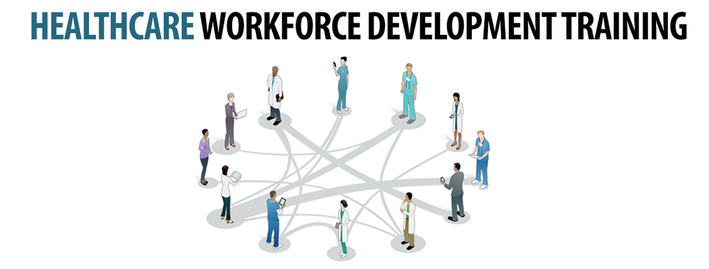NCFH is committed to providing high quality training and technical assistance services designed to meet the ever-changing needs of Health Centers across the country and other health and social service organizations. We offer a variety of training and technical assistance programs and services through various formats including phone consultation, hands-on training, customized webinars, and/or facilitation. Solution-focused, we will work with you to tailor a training to meet your organization's needs. NCFH has a team of highly trained and seasoned facilitators, trainers and health education professionals who will work with you and your staff to design and deliver a personalized program.
NCFH developed a process for identifying organizational needs and matching them to the training and technical assistance services. By taking a systematic approach, NCFH provides a customized solution to each unique situation. If you are interested in more information about any of these training programs, please email [email protected].
Click a training title below to view a description.
NCFH developed a process for identifying organizational needs and matching them to the training and technical assistance services. By taking a systematic approach, NCFH provides a customized solution to each unique situation. If you are interested in more information about any of these training programs, please email [email protected].
Click a training title below to view a description.
Check out our new Certificate of Excellence in Agricultural Worker Health (COE) Program that is dedicated to health professional working with agricultural workers and their families.
Training Titles:
An Orientation to Migrant Health
This workshop is intended to provide health center staff members with an orientation to or a refresher on the basics of Migrant Health. Topics include: demographics, working and living conditions, socio-economic characteristics, cultural beliefs and practices, health seeking behaviors, health care problems, barriers to accessing health care and the challenges for continuity of care. Funding sources and distribution, health care structure and types of health care services delivery methods will also be presented.
MIGRATORY & SEASONAL AGRICULTURAL WORKER VERIFICATION
This workshop is intended for health center personnel who are responsible for identifying, classifying, and reporting their agricultural worker patients in the Uniform Data System (UDS) for special population status reporting. This session will discuss the importance of determining ag worker status for UDS reporting, the skills and the tools needed to properly identify agricultural worker patients, and a mechanism for documenting the status of their agricultural worker users. Participants will receive the tools necessary to offer this training on an ongoing basis at their health center.
FOSTERING EFFECTIVE COMMUNICATION SKILLS
How often have you struggled to get your point across or to understand what someone else is trying to say? Does communication get in the way of working with your co-workers? Workplace communication is a process that can create organizational conflict and decrease service delivery. This program focuses on the improvement of communication and productivity within the workplace setting. Participants are guided through activities and invited to dialogue on issues related to trust and identified, and participants will explore methods to embrace these differences in a positive manner. We will explore methods to build optimal skills in internal and external interpersonal communications. This training will help to develop basic communication skills and styles; develop active listening skills and raise awareness of non-verbal communications.
ENHANCING CULTURAL COMPETENCY SKILLS
Many organizations identify themselves as culturally competent organizations. What does it mean to be a practicing and effective "culturally competent" provider? This intensive, skills-building session spotlights the concepts of cultural competency and the art of incorporating guidelines into practice among a broad client population. This session also meets the standards set forth in 2000 by the U.S. Department of Health and Human Services' Office of Minority Health. These standards were established to ensure that all individuals entering the health care system receive equitable and effective treatment in a culturally and linguistically appropriate manner. This workshop highlights the concepts of cultural competency and the skills necessary to deliver culturally competent services. Participants will explore the meaning of diversity and its relationship and impact on communication and human relations; they will increase awareness of their personal attitudes, beliefs and behaviors related to cultural diversity; and enhance skills for improved cross-cultural communication.
ENHANCING CUSTOMER SERVICE PRACTICES
Customer Service is the foundation for a successful and effective organization. The practice of delivering consistent and competent customer service will yield positive results for your organization both internally and externally. This training engages participants in interactive group exercises and discussions centered on effectively presenting the right attitude and the impact of behavior on organizational success. Participants will explore the meaning of creating an environment of service by creating a vision for the organization. Participants will also identify and apply eight customer service standards in the workplace and strategies for dealing with difficult situations.
IMPROVING HEALTH LITERACY FOR BETTER PATIENT OUTCOMES
The ability to read and understand health information and apply it effectively is a growing public health concern. A wide array of cultures call the United States home, diversity often reflected in patient/client populations. The complexity and scientific nature of health information can ultimately cause people to have difficulty in complying with therapeutic treatment for any given health issue. The Health Literacy Training is a program that is specifically geared to target and overcome issues surrounding health literacy and cultural awareness. In this highly participatory and interactive training, participants will engage in activities that demonstrate the difficulties that can be encountered when navigating medical instruction, ranging from prescriptions to procedures. Health care workers will develop the skills to apply verbal and written communication methods with their clients/patients in order to convey important health messages. Participants will also be directed to incorporate culturally appropriate messages in their communication with patient populations.
BASIC TIME MANAGEMENT SKILLS
During this interactive session, participants will discover personal time management skills that are essential for effectively managing multiple priorities. Participants will receive simple and practical techniques that can be implemented to increase individual and workplace productivity while reducing workplace overload—a key source of stress.
HEALTH CENTER PROGRAM REQUIREMENTS
Health center staff and governing boards need to be aware of the Public Health Service Section 330 program requirements and implementation measurements to assure compliance with the Health Center Program Requirements. This session provides an overview of the 19 Health Center Program Requirements and explores strategies for health center compliance with those requirements.
ESSENTIAL TRAINING FOR NEW HEALTH CENTER MANAGERS/LEADERS
New managers in health centers, many of whom have recently moved from an employee or worker role, often find themselves facing a number of challenges during the first months of their new positions, and many find that they begin this new role with little or no training. New managers who are forced to learn to be leaders through trial-and-error find the transition difficult because they are not fully prepared. Though many new managers may feel overwhelmed by new responsibilities, the first weeks and months in a management/leadership role can offer a critical opportunity for establishing a professional identity and developing crucial management skills. This training program is designed to provide new managers with the skills to effectively provide leadership and guidance to their health center teams. The training program contains four modules and addresses the following key topics: Overview of Basic Management Skills; Communication Skills; Program Planning and Time Management; and Employee Morale and Recognition. During this interactive session, the presenter will provide an overview of the training program and will provide an overview of the basic, yet necessary management skills needed to lead an effective team.
CORE COMPETENCY TRAINING FOR REGISTRATION AND FRONT-LINE STAFF
This training is focused on the improvement of worker satisfaction and increase retention among newly hired and incumbent entry-level, front line health care workforce members (receptionists, registration specialists, community health workers (CHWs), community outreach workers, etc.) by strengthening core competencies necessary to respond successfully to the demands of their positions, thereby improving performance which will lead to increased employee retention, elevation of the centers capacity to improve access to care and the patient experience for the special populations served. Participants will be able to achieve competencies in these two key areas: understanding the context of Federally Qualified Health Centers and cultural competence/population appropriate communication. Modules include: 1) An Orientation to Migrant Health; 2) Eligibility and Verification of Agricultural Worker Status; 3) Cultural Competency Skills; 4) Understanding Health Literacy; 5) Key Communication Skills; and 6) Basics of Customer Service.
HEALTHY ENVIRONMENT, HEALTHY LUNGS
Healthy Environment, Healthy Lungs is a comprehensive, culturally appropriate English and Spanish program especially designed for Community Health Workers (CHWs) or Promotores de Salud to implement a successful asthma education program. The intent of the program is that it will empower individuals with the knowledge they need to manage their asthma and to access the proper channels for improving the environment. This comprehensive and interactive training includes the following modules: The Environment and Our Health, All About Asthma, and Community Empowerment. The program includes a training curriculum and educational flipchart available for purchase.
GOVERNANCE & BOARD TRAINING FOR BOARD MEMBERS & EXECUTIVE STAFF
The unique role of the consumer majority board of directors within Community/Migrant Health Centers (C/MHCs) has been a critical component since the inception of the program in 1962 In order to be an effective member, it is vital to understand a board's roles and responsibilities and the HRSA expectations of C/MHC board of directors. Board and executive staff must work in concert with each other in order to achieve a healthy relationship and to fortify the corporation as a whole. Whether training is provided for the benefit of new members or as a refresher for established members, NCFH can facilitate a relevant experience for all participants in a bilingual modality. Training techniques rely heavily on an initial assessment of participants' needs and interests, and training is delivered in an interactive manner and responsive to the findings of the assessment. This training will assist participants in gaining a thorough knowledge of the components of being an effective board member in the following areas: the roles and responsibilities of board members, BPHC expectations of Migrant Health Centers, and an overview of a Migrant Health Center’s mission, board structure and by-laws.
COMMUNITY ENGAGEMENT: PREPARING FARMWORKERS FOR HEALTH CENTER BOARD MEMBERSHIP
Recruiting, integrating and retaining migratory or seasonal agricultural workers to serve on migrant health center board of directors proves challenging for many. One obstacle is finding potential candidates who are available and prepared to take on the role of a board member. This training program addresses this challenge by motivating, empowering, and developing the leadership capacity of agricultural workers to serve in a health center governance role, such as in an advisory council or board of directors. Training participants will learn about the migrant health center program and its governance requirements as well as roles the responsibilities of board members and the process for becoming a board member. This training is designed to be delivered directly to potential farmworker candidates prior to board recruitment but can also serve as a refresher for new farmworker board members. The training is available in English and in Spanish.

